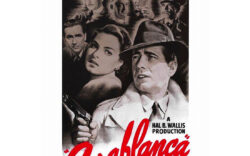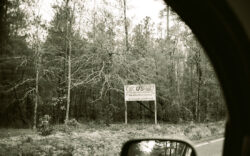No writer wants her bicycle stalled in the same Prince Avenue lane the No. 5 bus is roaring down. That’s the way I feel when it is brought to my attention that Athens has writers like Bradley Bazzle and James Chapin creating their fictions in the same town the rest of us share. What must it be like inside their heads? How do they take the same words available to all of us and massage them into such compelling narratives?
Take Bazzle. I met him once—friendly, unassuming. How could he write a book of short stories like Fathers of Cambodian Time-Travel Science? How could he write that title?
Bazzle’s stories reflect sort of the underbelly of our modern world, with protagonists who worry if they are losers while trying to get by in jobs like acting and advertising and real estate—younger people trying to adjust to the hustles and cons of the lower-echelon business world, with bosses and mentors who use them and hope they won’t catch on.
In the first story, “The Beard of Human Weakness,” the young real estate salesman is assigned by his boss, Mr. Hamilton, the task of unloading a deteriorating, half-built subdivision on acreage infiltrated by a toxic creek.
He admires Mr. Hamilton anyway: “All that joking and talking. Mr. Hamilton just really likes other people, I guess, even ones he’s about to screw over. Me, I’d rather be alone—or with Uncle Mitch.”
The kid lives with his Uncle Mitch, who is “from the future” and is trying to straighten out the present as best he can to keep some things from happening later. That kind of unsettling “out of time” element runs through a lot of the stories, such as “The Milkman,” in which an old-fashioned milk delivery man has much better milk than the store-bought. Several of the stories play with acting as an alteration of reality, and the title story sort of has it all: advertising, acting, time-travel (maybe) and the usual young protagonist trying to fit into what our country has become and to find some semblance of love. There’s a lot of humor, too, but much of it comes from the garishness and weird juxtapositions that confront somebody trying to make sense of it all.
Chapin, on the other hand, takes us to a completely different world in his novel Ride South Until Sawgrass. He conjures the territory of frontier North Florida, where settlers ride in on oxcarts and enterprising entrepreneurs steal cattle from the Seminoles and enslave Blacks. His is a hard, tough, cruel world, and his characters struggle for survival in a milieu so finely observed that you are relieved to crawl between clean sheets after you put the book down for the evening. The book is in four segments that involve the same families as they spiral through time, fighting to prevail in the harsh pine jungle.
Toward the beginning of the book, a young couple is separated when Quinto goes off on a month-long cattle roundup in the swamplands around the St. John’s River. As he returns to their handbuilt cabin in a clearing, he finds Lucy waiting.
“He got down from his horse and just dropped the reins. In the doorway they embraced, a little loosely, then separated and then came together again. This time they held each other for a long time. And still she did not let go the gun. She was saying something about wolves, saying it into his shirt collar, dampening it.”
Chapin’s characters come alive and pull you with them into the raw, violent world he meticulously observes.
Fortunately, you can get a taste of these books yourself and visit with Bazelle and Chapin Tuesday, Oct. 27 from 7–8 p.m. in a virtual Zoom event sponsored by Avid Bookshop. Go to avidbookshop.com to set it up. You can buy the books on the spot or come back later to the website. You’ll have to pour your own wine.
Speaking of Books: I am happy to report that Avid finally has copies of Millard Grimes’ hardback book The Last New Dealer. It’s a sprawling novel that brings a timely reminder of how Roosevelt’s policies fixed a lot of things that are now broken all over again. I reviewed it in this space on Aug. 12, but then Millard ran into delays with his publisher. It’s available from the usual other sources, too, but local writing ought to be bought locally, don’t you think?
Like what you just read? Support Flagpole by making a donation today. Every dollar you give helps fund our ongoing mission to provide Athens with quality, independent journalism.









